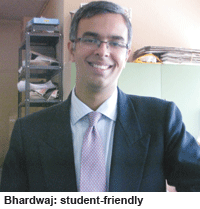 Ashish Bhardwaj is regional director (South Asia) of the Graduate Management Admission Council (GMAC), a US-based non-profit organisation of leading business management schools around the world which administers GMAT (Graduate Management Aptitude Test) — the premier standardised test used by over 1,500 B-schools worldwide for admission into their business and mana-gement programmes. Conducted simultan-eously in 110 countries and written by over 270,000 students annually, the 3 hour 30-minute computer-adaptive GMAT is the world’s most widely used assessment test for admission into B-schools.
Ashish Bhardwaj is regional director (South Asia) of the Graduate Management Admission Council (GMAC), a US-based non-profit organisation of leading business management schools around the world which administers GMAT (Graduate Management Aptitude Test) — the premier standardised test used by over 1,500 B-schools worldwide for admission into their business and mana-gement programmes. Conducted simultan-eously in 110 countries and written by over 270,000 students annually, the 3 hour 30-minute computer-adaptive GMAT is the world’s most widely used assessment test for admission into B-schools.
Newspeg. On June 5, the new format of the GMAT exam with a section on Integrated Reason was introduced. The new section requires candidates to answer 12 questions in 30 minutes to evaluate their ability to integrate information from multiple sources. This section is in addition to the other sections which test verbal reasoning, quantitative reasoning and analytical writing skills.
Direct talk. “The new Integrated Reasoning section, which measures the ability of candidates to synthesise, organise and evaluate information to solve complex problems, provides a new data point for B-schools to select the most appropriate candidates. For aspiring MBAs, GMAT offers the choice of applying to over 2,200 management programmes worldwide, including 160 programmes of Indian business schools,” says Bhardwaj, a chemical engineering graduate of NIT, Raipur and Faculty of Management Studies, Delhi University, who put in stints with Diageo Plc, egurucool.com and Citibank before signing up with GMAC as regional director in 2010.
History. Established in 1953 and now headquartered in Virginia, USA, GMAC has seven member schools in India (ISB-Hyderabad, IIM-Ahmedabad, IIM-Bangalore, SPJIMR-Mumbai, IIM-Lucknow, GLIM-Chennai and NMIMS-Mumbai). The unique selling proposition of GMAT is that candidates can write this computer-adaptive test at 18 centres in India, among 600-plus test centres worldwide over 300 days in a year. Moreover GMAT scores are valid for five years. A candidate pays $250 (Rs.13,000) to write GMAT.
“GMAT is unparalleled in terms of student friendliness. At the start of the test, a candidate is presented with a question of medium difficulty. A correct response prompts the next question of increased difficulty, and an incorrect response prompts the next question of lesser difficulty,” says Bhardwaj.
Future plans. Looking ahead, Bhardwaj believes that GMAC will enable B-schools in India to have greater diversity in choice of students, and that it will succeed in disseminating information and increasing awareness about the value of management education in South Asia.
Summiya Yasmeen (Bangalore)